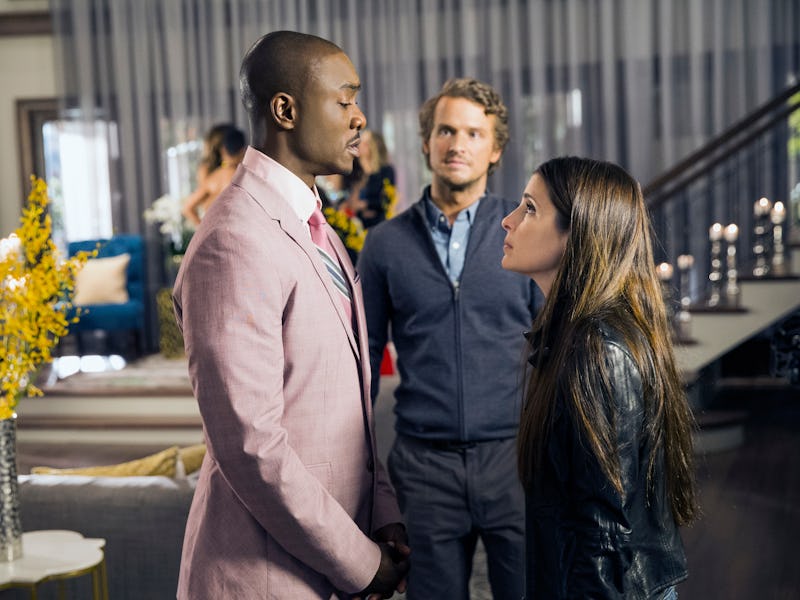‘UnREAL’’s Most Controversial Episode May Be its Worst
Did the showrunners of the incendiary Lifetime show go too far this time?

UnREAL often leaves its loyal viewers feeling uncomfortable and even appalled. But rarely does it make them feel totally disgusted – or skeptical of the show’s intentions.
After the catastrophic, disturbing conclusion of last night’s episode, I felt uncertain about whether my repulsion was directed at the world-within-the-show, or the show itself. UnREAL delivered the most shocking and perhaps ill-conceived blow in its season-and-a-half run, tackling the Black Lives Matter-related themes it had been skirting all season — with the inclusion of a black suitor, Darius (B.J. Britt) and a BLM activist contestant, Ruby (Denee Benton) — head on.
That is, perhaps, the problem. This season, UnREAL has treated these serious and manifold issues dangerously tangentially — often, it’s oversimplified them. But then again, so does Everlasting…: Largely, the point of last night’s brutal episode – and the season – is that Rachel’s self-delusion (noted by the returned Adam last night) that she is doing something meaningful, important, and #good with this season of Everlasting… presents a logical fallacy — a pathetic fairy tale she tells herself. Fiction, also, generally over-simplifies the real world events it grafts onto a larger narrative.
Often, at its darkest moments, the perverse ambitions of Everlasting… fold into those of UnREAL. The real show’s soap opera-y dynamics, voyeuristic lens, and manipulative plotting leave us feeling as perversely invested as the Everlasting… viewer. This is, of course, a large part of what makes UnREAL one of the most unique shows on television: that feeling of being as suffocated and psychologically warped by the characters’ environments as they are.
Spoilers follow.
But last night, Sarah Gertrude Shapiro and Marti Noxon’s show became an unusually uncomfortable simulacra of Rachel and Coleman’s compulsions: to shock viewers more and more. At the end of the episode, Darius, reunited with Romeo and geared up to escape Everlasting… as soon as possible after the debacle of an Alabama trip, takes an ill-fated joyride with Tiffany and “Hot Rachel.” Rachel and Coleman, in a nearly-too-incredible turn, decide on the spur of a moment to stage a police run-in — with, apparently, no thought for the potential consequences. Rachel instantly calls the local PD, and somehow, she, Coleman, and crew quickly run out with a camera to intercept footage from the bushes.
Police incidents are commonplace for reality show drama, and perhaps they are, indeed, orchestrated. I’m sure Noxon and Shapiro have some inspiration – or a anecdote, plucked from their knowledge of the workings of “real” reality TV. The episode feels literally unreal, almost corny, and definitely questionable in its intentions when Romeo is gunned down by one of the officers. Perhaps the point of making it so out of nowhere is that these are actually how such tragedies happen, which is true. But that doesn’t prevent it from feeling awkwardly carroted into the plot of the show, and uncomfortably on-the-nose (an outright shooting, as opposed to revelatory abuse of a different sort?)
Then, of course, we are back in the control room with Rachel’s guilt and nervous breakdown, and watching Quinn struggle with how to handle her rapidly-intensifying new relationship. It is not as if Romeos near-fatal shooting (will it be fatal?) stops operations. It’s the fact that Rachel dissolves, and we end with her in the asylum, not in the hospital with Romeo and Darius.
The question becomes: Is the fact that the shooting seems to be largely functioning as a complication in Rachel’s narrative intentionally – or incidentally making a statement about white privilege? Are we meant to sympathize with Rachel as she pops her placating pills in the cartoonish, prison-cell-like asylum room (really?), or are we meant to think of what she’s done as an abdication of responsibility? Is UnREAL deliberately making as weak a statement about police brutality as Everlasting… to make a kind of meta-statement?
It’s possible for it to be both, on some level. Our heart goes weakly out to many different people in this chaotic episode, perhaps the returned, borderline-rapey Adam least of all. As we’ve long understood, UnREAL has no heroes, and seems to aim to complicate any allegiances viewers form to certain characters at a given moment. Perhaps this complication is another example.
But as this episode wraps, it’s hard not to feel that showrunners Noxon and Shapiro have wandered into this plotline in an insensitive way, and retracted from it even more discomfortingly. It feels positioned it as just the next big thing for Everlasting…: the sequel to last season’s suicide, the only thing that could be more fucked-up.
Of course, Everlasting… is not a show about police brutality, and neither is UnREAL. One is about a sham couple getting together, and the other is about Rachel and Quinn. But what are we meant to think of the fact that Rachel can run from this – and doubtless get away with her deadly ploy? Are we more grossed out about the pacing of the show — in and out of horrifying tragedy, as a subplot — or the world of the show? How self-reflexive, and self-aware, is UnREAL, really?
Perhaps we’re meant to think of UnREAL as kind of a microcosm of society in this case: a moment of mourning and guilt for our own role in creating a culture that makes such horrifying incidents possible, and then back to business as usual. In some sense, it’s always been a cracked mirror to white, patriarchal, and myopic America. Or perhaps the discomfiting import of this episode is all an unhappy accident. It will take at least the final few episodes of UnREAL to clarify.